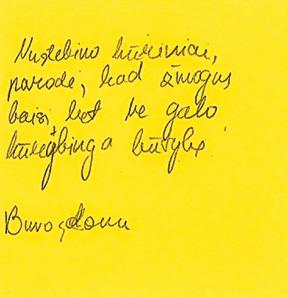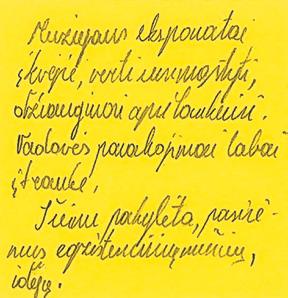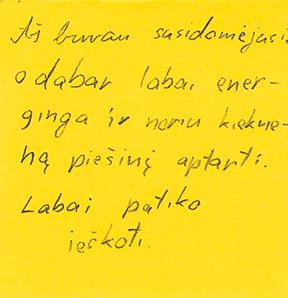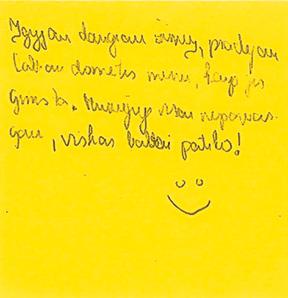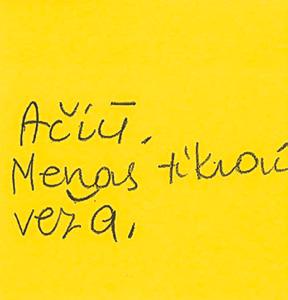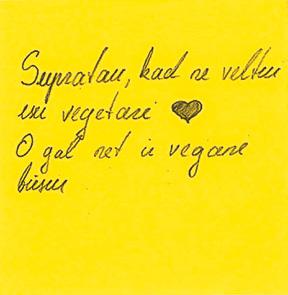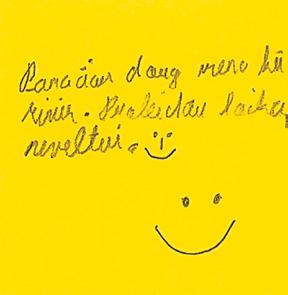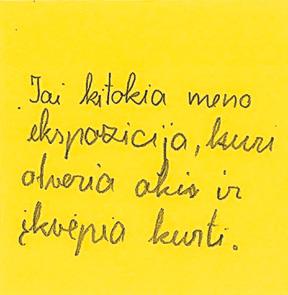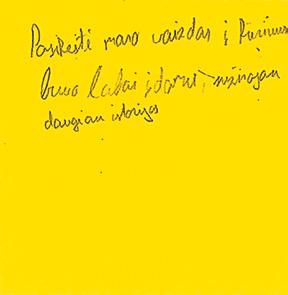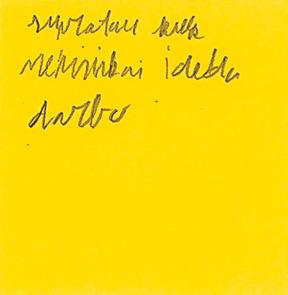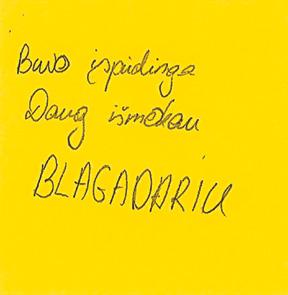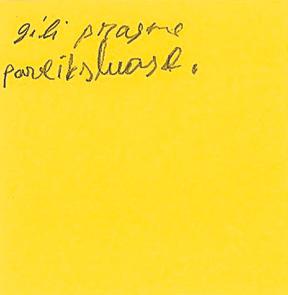
7 minute read
Cultural Education

As told by Project Manager for Education Jurga, Events Project Manager Birutė, Educator Karen and Tour Guides Coordinator Barbora
Advertisement
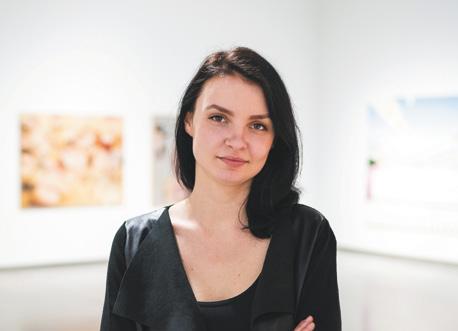
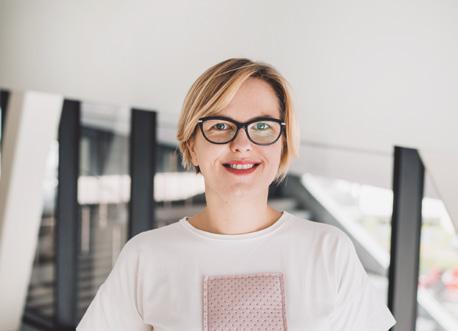
We see the museum as an inspiring force encouraging life-long learning. Therefore, we see innovative interdisciplinary cultural education for all ages as a one of MO’s key priorities.
We have a broad understanding of education. Education activities and events continue both in the museum and
around Lithuania. We are building a virtual museum with its contents accessible to everyone despite geographic or financial restrictions.
We will briefly present our work in the area of cultural education for families, adults and children in 2020.
FOR FAMILIES FOR ADULTS
It is highly important that families can discover their connection in the museum and the museum can be a place for their comprehensive dialogue.
We focus a lot on Family Sundays where we invite families to play and enjoy the surroundings of the museum. Every major exhibition makes Family Sundays different. This year it reflected the topic of the exhibition Why Is It Hard to Love? Sundays were full of children’s emotions and new experiences even within the constraints of the pandemic. Until it was possible special kids meniu at MO Bistro added to the impression. We did our best for Family Sundays to take place online in autumn and winter.
We created an exercise book MOmukai (MOmuks) for every major exhibition to make the visit to the museum for a family with children aged 3–8 as enjoyable as possible. The book also makes it easier to discover and learn about the exhibition.
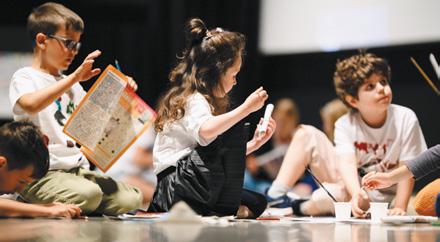
The novelty introduced this year was a Quiz at the Exhibition for families with older children or those with friends. Everyone loves to play and playing is an amazing way to learn! These quizzes are available at the museum and online too. MO is full of discoveries for adults too. We invited our visitors not only to the MOrathon festival that opened the grand exhibition, but also encouraged to look for inspiration and discover even more quality contents at the museum and our website mo.lt. In summer, programme of MO Outside was implemented, we had tours of Vilnius Talking Statues, launched the series of events The Art of Being, looked for inspiration in workshops with artists who are the authors of the MO Collection. In autumn, we returned with everyone’s interest-attracting Ričardas Jankauskas’ talks Back2School. We also planned mindfulness sessions which unfortunately could not take place due to the pandemic and we will start them in 2021. So here we will tell your more about the main projects.
MOrathon
As usual, we open every major exhibition with the MOrathon festival. In 2020, during the exhibition Why Is It Hard to Love? MOrathon we explored the topic of love for ourselves, for others, and the ability to communicate with ourselves and others from different perspectives and in different forms.
The Art of Being
Starting with September, we held thematic meetings with professionals from all walks of life in our new series of events The Art of Being. We talked about the inspiring things these professionals do using some artwork from the MO Collection as a starting point of the conversation. Creative workshops with the authors of artworks in the MO Collection also took place. The events however were interrupted by the second lockdown, so we moved them into the digital space and the cerative workshops were replaced with a virtual format of Talks with Artists.
Based on the results of the representative survey carried out by Baltijos tyrimai, the interest of young people in modern and contemporary art grew by 9 percent in 2020, i.e. from 25 to 34 percent and is higher than overall national average.
MO Conversations
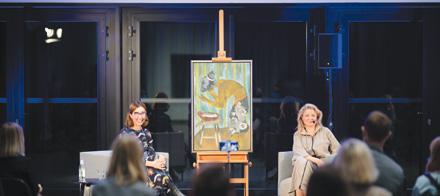
In April, MO was attended by tourists from all over the world when weekly virtual educational art classes in English began. Educator Karen moderates the conversation by using the method of visual thinking and selecting pieces of art from the MO Collection. People from various parts of the world joined the conversations and enjoyed learning about Lithuanian art. Those who attended the conversation would hardly find Lithuania on the map but the pieces of art that they experienced inspired them, allowed them to feel the sense of community and find their own meaning. The whole process of conversation is like seeing life through the perspective of art.
We are Americans living in Portugal. We thought that visiting the MO on our computer would be a quaint and so very “millennial” way to escape the stress and boredom of being lockeddown.
Our minds were blown. Karen, with her VTS questioning and firm intellectual hand of guidance through the world of these Lithuanian artists, has made me able to see ideas I was unaware existed.
Allen and Janice Jaworski, participants of MO Conversations
FOR CHILDREN AND SCHOOLCHILDREN
Education
We try to show children the possibilities of art to speak and tell about the world. We want to get through to their inner issues they care about. We call them to experience a personal connection with art.
Museum is a great platform that can serve as a meaningful addition to the formal education. We continued developing three innovative interdisciplinary education trends: emotional intelligence, visual thinking and integrated classes.
This year, we focused on visual thinking programme. Scientific studies have shown that visual stimulation experienced when watching works of art is essential for children’s cognitive development. This is how children learn to summarize and reflect on their experiences both something they have gone through and something not encountered before. Educational part of the Travelling Museum was also based on visual thinking as well as the project implemented in cooperation with the British Council in Lithuania Visual Thinking Exchange Through Art. You can read more on this in the section the Travelling Museum.
The integrated classes mostly attracted Lithuanian language teachers. Next year we hope history, English and teachers of other subjects to join.

It is important that teachers started discovering emotional education activities as a way to address issues within a class. These activities are for different age groups: children in preschool and elementary school learn about emotions, 5th to 8th graders undergo a complicated transformation and talk about conflicts and solutions. We also started an activity for older schoolchildren to address coming of age related to the issue of how to belong to a group and preserve one’s identity.
MO summer camps for children
Learning and discovering the world through art continued in summer 2020. MO camps organized for the second summer already attracted many curious children.
In 2020, we had a drama camp, creativity camp and a camp for senses where children could learn about different kinds of art, their feelings and emotions as well as see themselves creating. We had five summer camps attended by 110 children of different ages.
Children’s night at the museum
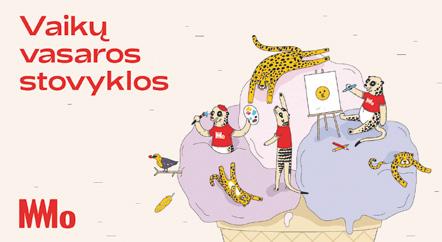
The popularity of MO children’s summer camps encouraged us to look for even different, unexpected experiences for children during the cold season too.
Children’s night at the museum became a true phenomenon! Having offered this new format and the first night programme for children at the museum in Lithuania we were truly surprised to see that all the camp was booked in one day. Seeing the need, we immediately announced the dates for the second camp which was also sold out immediately!
Unfortuntely, long-waited night camps had to be cancelled due to the COVID-19. We still hope to host them in the future and look forward to welcoming young nocturnal visitors at the museum!




